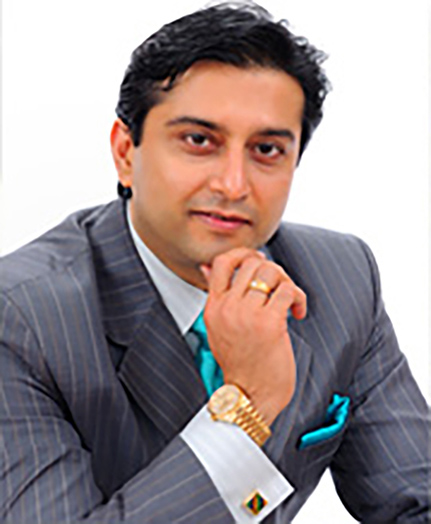
HEALTH IS WEALTH

I am humbled and honored to write this piece on health care. For the last many years, the column was being handled in a superb manner by Dr. M.P. Ravindra Nathan. His articles on various health care issues were widely admired and followed by the readers of Khaas Baat. It is a difficult task to follow him since he had set the bar so high. He has been a role model for me and many others. He has been doing a fabulous job for so many years and had become a permanent fixture and image in our eyes. His contributions and participations in various charitable, educational and cultural activities have been well-appreciated nationwide. He has made remarkable contributions to the literary world. In addition to the regular column in Khaas Baat, he has been editor of various souvenirs, magazines, journals, author of two books, and penned numerous articles in newspapers, magazines, medical and non-medical periodicals.
I thank Nitish Rele, editor of Khaas Baat, for having faith in me, by asking me to continue writing this column on health care for the readers. I shall try and do my best. I hope the readers will bear with me for my deficiencies or drawbacks. I request you to feel free to write, call or e-mail me with any suggestions, questions or comments. Maintaining good health is a top priority for everyone, irrespective of age, sex, ethnicity, job, position, power or money. Nothing matters if your health is not satisfactory to enjoy life, carry out your duties, work and meet obligations. It is said that one needs good genes, good health and good luck to have a good life.
Good health depends on ‘nature’ and ‘nurture.’ A good measure is dependent on our genes or DNA. It is predetermined at birth. There is not much we can do about it. Good health also depends on our habits, conduct and lifestyle. It is our making, and by nurturing good lifestyle measures, we can hope to have better health and quality of life and longevity.
So, what are these good lifestyle measures that will help us? They are ordinary common-sense measures that can be broadly categorized as diet and nutrition, exercise, stress reduction strategies and preventive health care. It may sound simple. But statistics show that nearly half of our illnesses and half of the hospitalizations are avoidable. In other words, the root cause of these problems can be traced to behavioral and lifestyle issues. Some of these items will be discussed in detail in subsequent issues in the following months.
Medical science has made remarkable progress during the last 100 years. Many wonder drugs, including antibiotics, were discovered. Several new surgical procedures, including transplantations, are being performed. Many innovative diagnostic tests such as CAT and MRI scans can detect disorders and cancers early. Additional therapeutic modalities are coming into vogue. We understand principles of asepsis, sanitation, biology, cellular function, genetics and environmental influences better than before. The results show that we have doubled our life expectancy in the previous 100 years.
But we can improve on these accomplishments and continue to make further progress. Numerous unnecessary deaths and disabilities in the younger age can be avoided by reducing gun violence, drug addiction, poor eating habits, poor behavioral problems, stress and related social issues. Common sense measures such as hand washing, cooking the food, clean drinking water, proper sanitation measures, regular medical checkups, and hygienic precautions can reduce infections and infestations.
Good health implies both physical and mental well-being. People are lonely and depressed. Several of their medical problems are related to mental status, depression and social situations.
American health care system is one of the most expensive ones in the world. However, it lags other countries in the outcome, upon measuring parameters such as life expectancy, maternal and infant mortality, infection control, and level of satisfaction by the patients as well as the providers. The recent Covid-19 infection resulted in more infections, and more deaths in United States than many other nations.
Modern health care system is focused on quick fixes and instant gratification. We are into disease management rather than preventive health care. Tests, surgery, procedures get more importance rather than cognitive long-term care. New devices, drugs, procedures get the advertisement. Marketing, competition and businesses focus on quick turnover. Ignorance and prejudice are other factors. During the pandemic, there were individuals who refused to take the vaccinations and refused to wear masks.
American health care system offers the best technology and advanced procedures. At the same time, it is highly expensive, with unequal access, too many protocols and legalities. The system is fragmented. It has good and bad sides. Hence, it behooves the public to be informed and educated.
We need to pay attention to the health care issues from womb to tomb. Everyone is important for society. It is not just living longer that matters. How well we live matters equally.
Health is wealth. With better health, we can build a better society.
Dr. Venkit S. Iyer, MD, FACS, is a retired General and Vascular Surgeon. He has authored four books – “Decision making in clinical surgery,” “Aging well and reaching beyond,” “The Clinic” and “Geriatrics Handbook.” They are available through Amazon or from the author. His website venkitiyer.com has necessary links and contact information.
Editor’s Note: Khaas Baat sincerely thanks Dr. Ravindra Nathan for his valuablecontributions through his monthly health column starting with our first year of publication.
EYE CARE
September is Healthy Eye Aging Month

Tips for Maintaining Clear Vision and Eye Health
As we journey through life, our eyes play a pivotal role in how we experience the world around us. Just like the rest of our body, our eyes undergo changes as we age. While some changes are natural, there are steps we can take to support healthy aging of our eyes and maintain clear vision. Here's a guide to help you understand the process of aging eyes and how to keep them healthy for years to come.
Understanding the Aging Process of the Eyes:
The aging process affects various parts of the eyes, leading to changes in vision and eye health. Some common age-related eye changes include:
- Presbyopia: This is a natural loss of near focusing ability that becomes noticeable in your early to mid-40s. It's why many people start using reading glasses or multifocal lenses.
- Dry eyes: As we age, the eyes may produce fewer tears, leading to dryness, irritation, and discomfort.
- Floaters and flashes: These are small specks or cobweb-like shapes that seem to drift around in your field of vision. While usually harmless, sudden changes in floaters or flashes could signal a retinal issue requiring prompt attention.
- Reduced pupil size: The pupil size may decrease with age, affecting how much light enters the eye and potentially causing difficulty seeing in low-light conditions.
- Changes in color perception: Some color perception changes can occur as the lens of the eye becomes less transparent over time.
- Increased risk of eye conditions: Aging increases the risk of conditions like cataracts, age-related macular degeneration (AMD), glaucoma and diabetic retinopathy.
Tips for Healthy Aging of the Eyes:
- Regular eye exams: Routine eye exams become even more critical as you age. Comprehensive eye exams can detect early signs of eye conditions and ensure your prescription is up-to-date.
- Nutrition for eye gealth: A diet rich in antioxidants, vitamins and minerals supports eye health. Foods like leafy greens, colorful fruits, fish high in Omega-3 fatty acids, nuts and whole grains are beneficial.
- Hydration: Staying well-hydrated supports tear production and helps prevent dry eyes.
- UV protection: Sunglasses that block UV rays protect your eyes from sun damage and reduce the risk of cataracts and AMD.
- Quit smoking: Smoking increases the risk of eye conditions, so stopping is a significant step for maintaining healthy eyes.
- Manage chronic conditions: Conditions like diabetes and hypertension can affect eye health. Work with your healthcare provider to manage these conditions effectively.
- Screen time and eye care: Practice the 20-20-20 rule when using screens: every 20 minutes, take a 20-second break to look at something 20 feet away.
- Eye safety: Wear protective eyewear during activities that pose a risk to your eyes, such as sports or home repairs.
- Stay active: Regular physical activity supports overall health, including eye health, by promoting good blood circulation.
- Stay informed: Stay educated about age-related eye changes and conditions. Knowledge empowers you to recognize potential issues and seek timely medical attention.
Proactive Steps to take for Vision enhancement:
Vision enhancing steps that you can take as discussed in my previous columns, if you notice your reading vision decreasing, you can opt for laser vision techniques or multifocal lens surgical techniques to make you see distance and near. And if you feel you have cataracts, you can undergo early cataract surgery with new generation lens implants for all ranges of vision. If you have dry eyes, that can be corrected and also if you have had previous Lasik surgery or previous radial Keratotomy surgery, you could be helped so you can gracefully age with better vision rather than wait for vision to decrease and then take action.
Conclusion: Embracing Clear Vision and Eye Health as You Age
Aging eyes are a natural part of the life journey, and by taking proactive steps, you can support healthy eye aging and maintain clear vision. Regular eye exams, a balanced diet, UV protection, and other preventive measures can make a significant difference in preserving eye health. Remember, eyes allow you to appreciate the beauty of the world, so investing in their well-being is an investment in your overall quality of life.